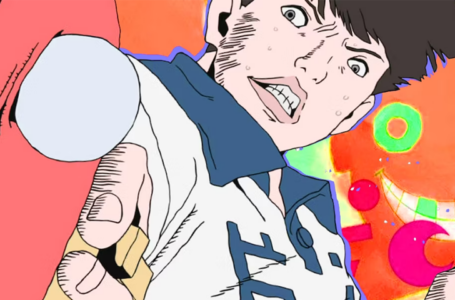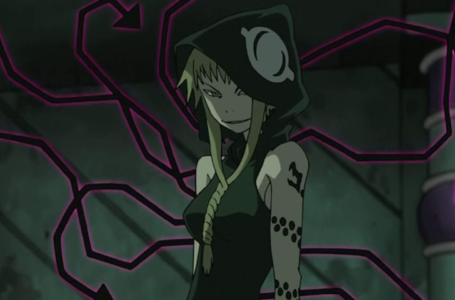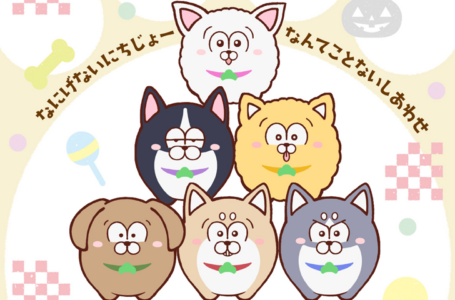Blue Reflection Ray: turning regret into strength
So far we’ve seen that Blue Reflection Ray, the anime spinoff of Gust’s Blue Reflection, is playing the long game. The first two episodes played things fairly slow, taking the time to introduce our main characters Ruka and Hiori, and during that time helping to foster a feeling of connection and intimacy between the pair of them.
Episode two concluded with a cliffhanger: Hiori was preparing to defend her schoolmate Miyako from the mysterious “red Reflectors”, who were seemingly attempting to steal a crystalline flower from inside her. This flower is a “Fragment”, a manifestation of an emotion, and one of the key aspects of both the original Blue Reflection game and the Blue Reflection Ray anime.
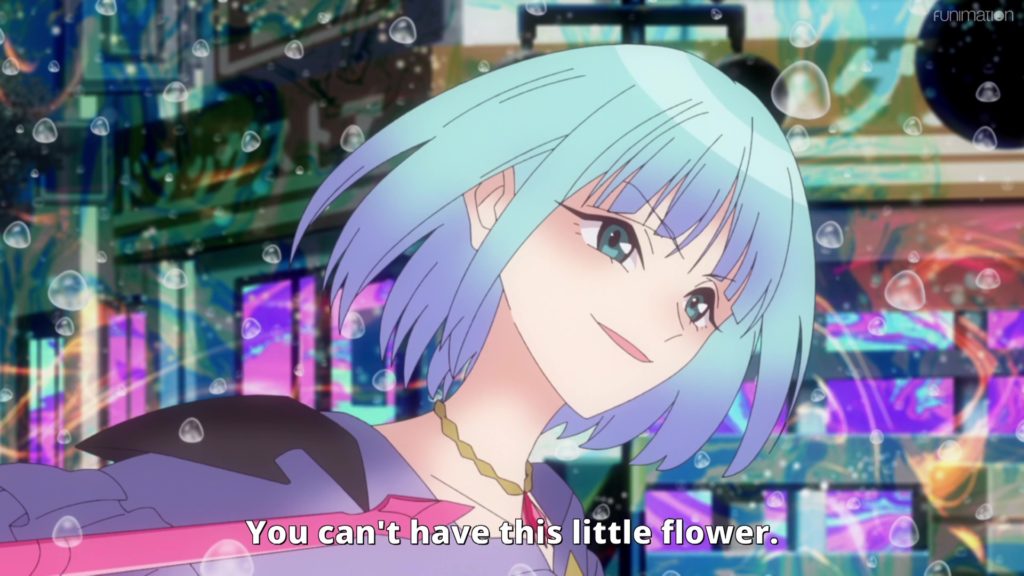
As the battle between Hiori and the red Reflectors gets underway in the third episode of Blue Reflection Ray, we start to understand the differing approaches between the two groups of magical girls. The blue Reflectors seek to understand and accept the Fragments, allowing their owners to hold on to them and use them as a means of learning how to grow and heal despite adversity, while the red Reflectors seek to steal the fragments; in their eyes, they are “taking the pain away” from those who are suffering, but in the process also depriving them the opportunity to explore and understand their own feelings — and why those feelings came about in the first place.
The two distinct philosophies highlight how mental health is not something that has a “quick fix” under most circumstances; while immediately cutting off the source of anguish may appear like a neat and tidy way to “fix” an issue, it doesn’t really solve anything. Rather, the struggles we encounter help to define who we are — and how we overcome them helps define our personalities and outlook on life in the long term.
It is by struggling with this concept that Ruka finally manages to awaken to her power as a Reflector in her own right. Full of guilt for what she sees as past failures, she doesn’t believe herself worthy of understanding the feelings of others — even though she is overwhelmed by the intensity of the empathy she is feeling for Miyako while she is suffering.
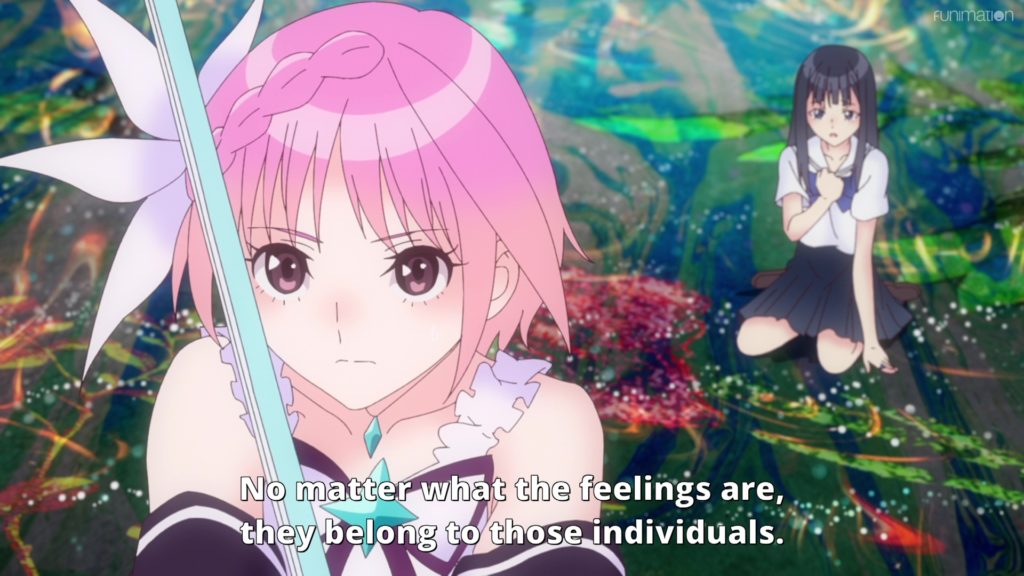
Ruka’s biggest hangup is actually an interesting mirror of a situation we’ve previously seen in Blue Reflection Ray: catching sight of a girl who appears to be in distress. On the occasion we’ve seen this in the series already, Ruka noticing the girl in question is what prompts Hiori into action, ultimately resolving the situation more than satisfactorily when it transpires the girl wasn’t actually “crying”; she simply had something in her eye.
But on the occasion in Ruka’s memory, she remembers seeing a girl standing in the rain, clearly upset about something. There was no-one else around aside from Ruka, and it’s clear that Ruka wanted to approach the girl, comfort her and ask what was wrong — but ultimately her courage and her low self-esteem let her down.
She convinced herself that the girl wouldn’t want to talk to her, that she somehow wasn’t worthy of being the one to comfort her — in other words, she ascribed her own feelings to the girl instead of attempting to understand them — and instead fled from the situation. In the process, she left something of a scar in her own mind; a memory of regret that, in dark times, she finds herself constantly ruminating on — particularly as it appears the young girl’s story did not end well.
Naturally, the worst possible time to fall into a depressed fog and ruminate on your regrets of the past is when your friend is facing down a pair of probably-evil magical girls, so of course this is what Ruka ends up doing. She is ultimately somewhat snapped out of her less than blissful reverie by Hiori’s assertion that what the red Reflectors are doing is inherently wrong; as Hiori points out, “no matter what the feelings are, they belong to those individuals; you can’t just steal them away.”
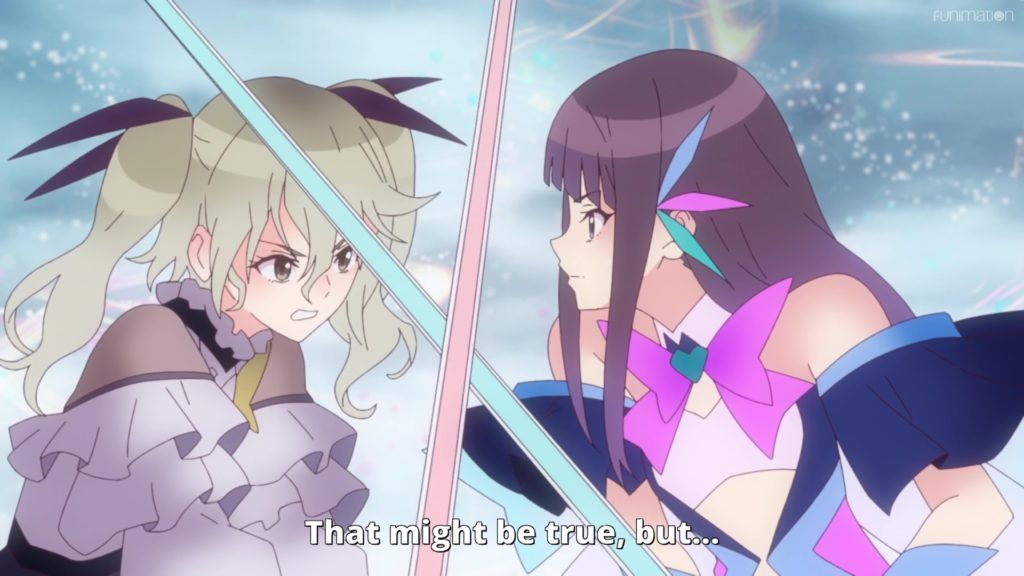
Hiori’s words resonate with Ruka, because they provide her with a new way of looking at the situation she feels so guilty about — and provide her with an opportunity to heal, grow and understand herself a bit better.
“You said that I was fine as I am,” she says. “But because I didn’t reach out then… I just told myself that I wouldn’t be able to help her, and decided how she should feel about me. If I had even said one word to her, something might have changed. But I’ll never be able to find that out. Because she’s… gone now.”
Ruka’s desire for this never to happen again is what ultimately spurs her first transformation into a Reflector; the sheer intensity of her feelings, and her passion to make up for a mistake that she feels she can never really atone for is what allows her to draw out her inner strength. She has an opportunity in front of her to help someone, and to understand their feelings; so rather than just assuming the other person’s feelings, as she did once in the past, she can take a step forward and acknowledge them. Because that’s what a Reflector does — a blue one, anyway.
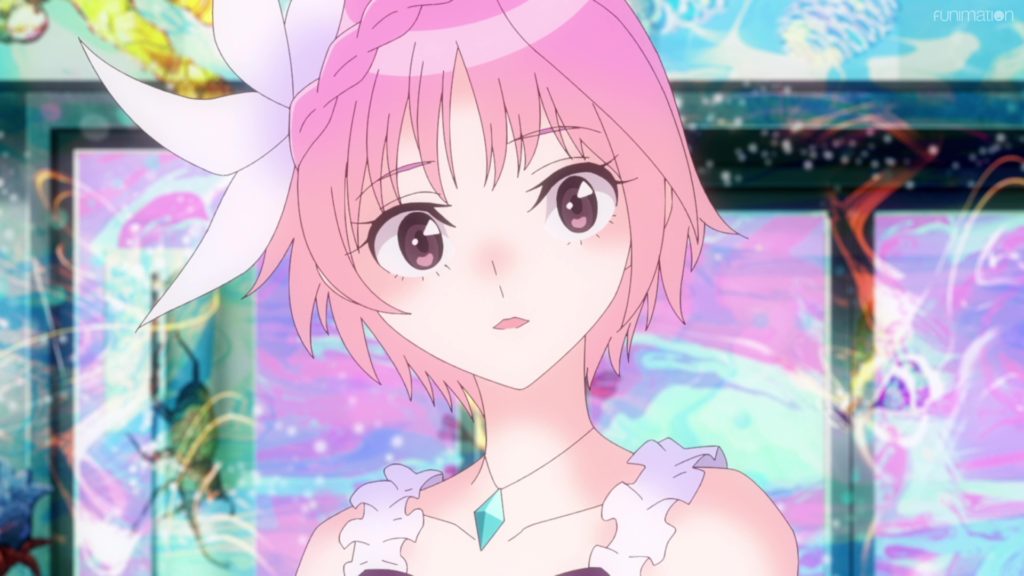
“There is something that I understand now,” says Ruka following her transformation. “No matter how sad those feelings are, how much pain and suffering they may cause… even then, we can’t be the ones to decide for them.”
“Feelings belong to their respective owners,” adds Hiori. “There’s plenty that people want to forget, but it’s because of those feelings that people can move forward.”
This is clearly going to be a running theme over the course of Blue Reflection Ray, and it’s explored a little further in the fourth episode. Having been rescued by Hiori and Ruka — and having a vague understanding of their contribution to the situation — Miyako finds herself able to move forward for the first time. She stops trying to live for her mother’s approval — something which we saw in the first two episodes is something she will sadly never truly achieve — and instead opts to strike out on her own.
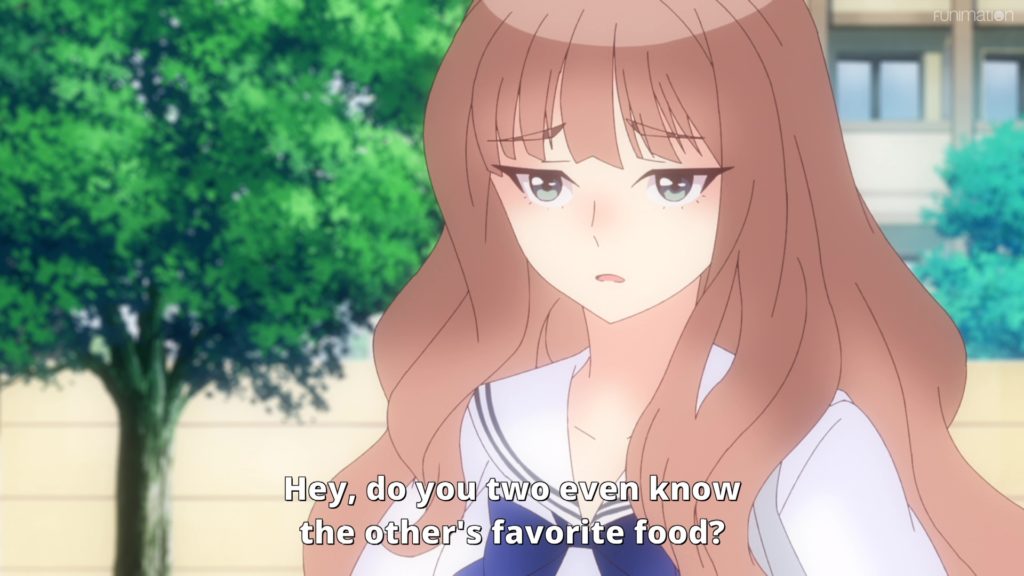
In other words, she comes to the conclusion that instead of getting hung up on something she is unable to change, what she can do instead is acknowledge that there’s a problem there, and start to do something about it. In her case, she moves out from her family home and takes up residence in the dorms where Ruka and Hiori live — initially, she rooms with them, but by the end of this episode of Blue Reflection Ray she has a place to call her own.
The time the three spend together gives them all the opportunity to get to know each other — and for Hiori and Ruka to contemplate how they might be able to improve their capabilities as Reflectors. To their surprise, their mentor figure Momo appears hesitant to train them, though it’s not for the reasons they assume. They believe that Momo thinks they’re not ready to take the Reflector life a little more seriously, but in fact Momo has her own hesitance about the situation due to the fact she believes she’s seen Hiori’s missing sister on the side of the red Reflectors.
Unfortunately, once again what this leads to is further proof if proof were needed that making assumptions about someone’s feelings — thereby “taking them” for yourself — leads to misunderstandings at best, regrettable situations at worst. Although in turn, the feelings that those assumptions create can then drive people on to improve themselves in ways they hadn’t contemplated before. Feelings are complicated; it’s a seemingly simple message, but the nuanced way in which Blue Reflection Ray explores it is rather thought-provoking.
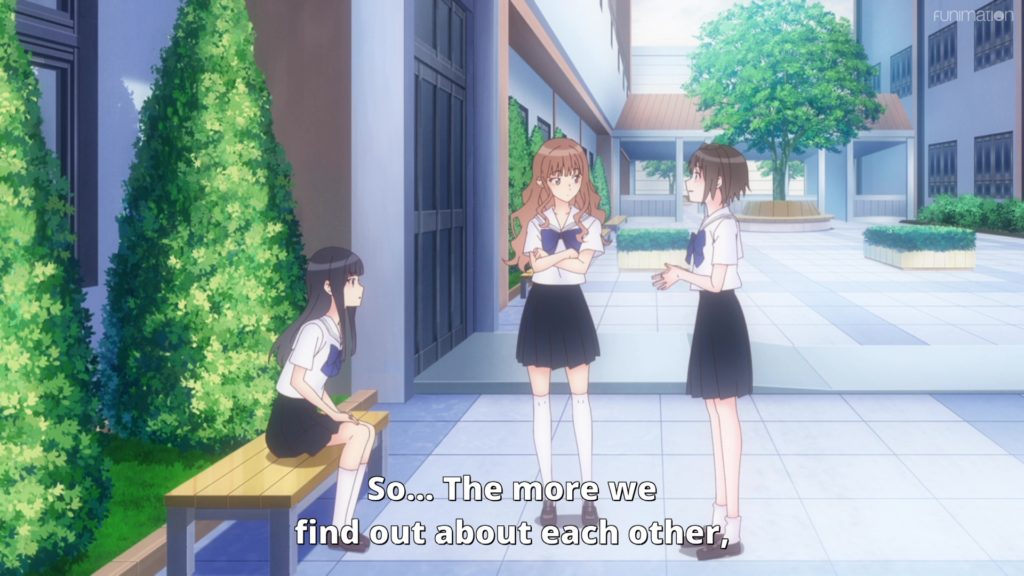
In Hiori and Ruka’s case, an offhand comment spoken in frustration by Momo leaves them feeling that they’re fundamentally incompatible with one another, and that they should “get to know each other” a bit better in an attempt to rectify this. But every effort they make in this regard seems to further emphasise the fact that in many ways, they are complete polar opposites. Their respective reactions to this growing understanding is even diametrically opposed; Ruka is upset and frustrated, while Hiori seems oddly happy about the situation, presumably working under the assumption that “opposites attract”.
Right on cue, this episode of Blue Reflection Ray emphasises the idea of opposites being complementary rather than adversarial by highlighting the relationship between the school’s best known tennis partnership — a pairing so well-respected that they have their own collective nickname; the “EmaYuma Duo”.
But all is not well behind the scenes in the partnership; Ema, the more seemingly assertive, “dominant” member of the partnership is actually insecure about her tennis skills, while Yuma, the meek and submissive partner is actually the one with the real talent. And the pair clash as a result; Ema believes Yuma just agrees with her as a matter of course, while Yuma, clearly having some insecurity and anxiety issues as a result of past bullying, doesn’t wish to rock the boat lest she find herself without a partner.
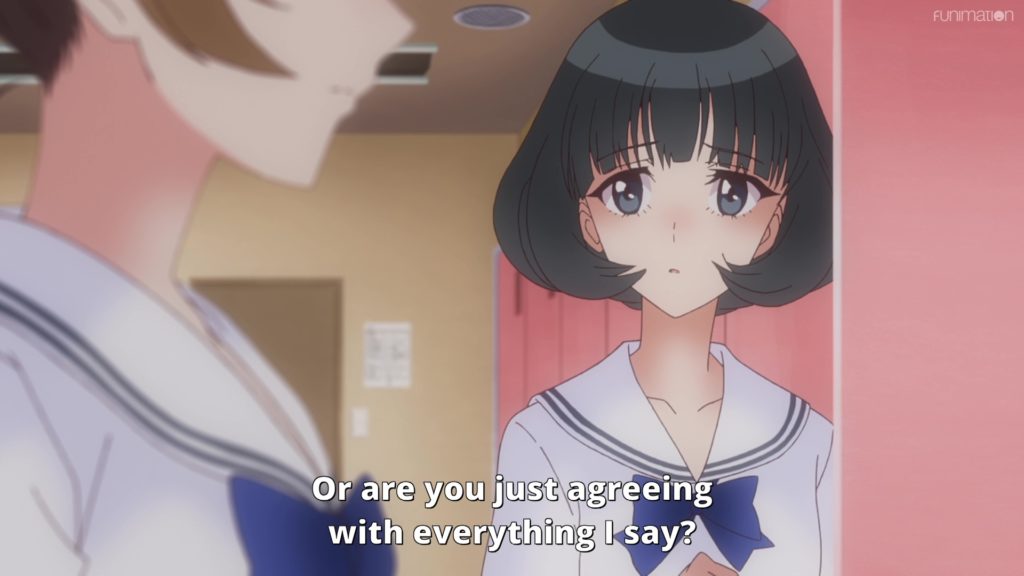
In practice, the fact that the pair are so well-regarded as a tennis-playing duo is proof enough that their two contrasting personalities actually complement one another rather well, but Yuma in particular is left with a sense of crippling self-doubt. And, as you might expect from the way Blue Reflection Ray has gone up until this point, this causes her to go Rampant — and for the red Reflectors to show up, ready to take her “flower” away from her.
This time around, our heroines are ready for action, however — and Momo, who has been doing some soul-searching in the intervening time, has also come to a few conclusions of her own. Momo, you see, is also someone who is full of regret; in the early episodes, it was suggested that she had dropped out of school and had just been sort of coasting through life without any real ambition until she discovered her talent as a Reflector. In this fourth episode of Blue Reflection Ray, we finally get confirmation of this — along with the fact that she genuinely feels badly about the way she behaved.
Just as Ruka drew strength from her feelings of regret, however, so too does Momo. While she still stands, she has the opportunity to make things right, so she refuses to give up. And, in turn, the three Reflectors are all inspired by one another; Momo is inspired by how Hiori and Ruka have worked so hard to try and “resonate” despite their obvious differences, while Hiori and Ruka are excited by Momo’s new-found determination. As the fight for Yuma’s feelings gets underway, it becomes very clear that the three of them have come to understand one another a whole lot better — and without necessarily having to spell things out explicitly.
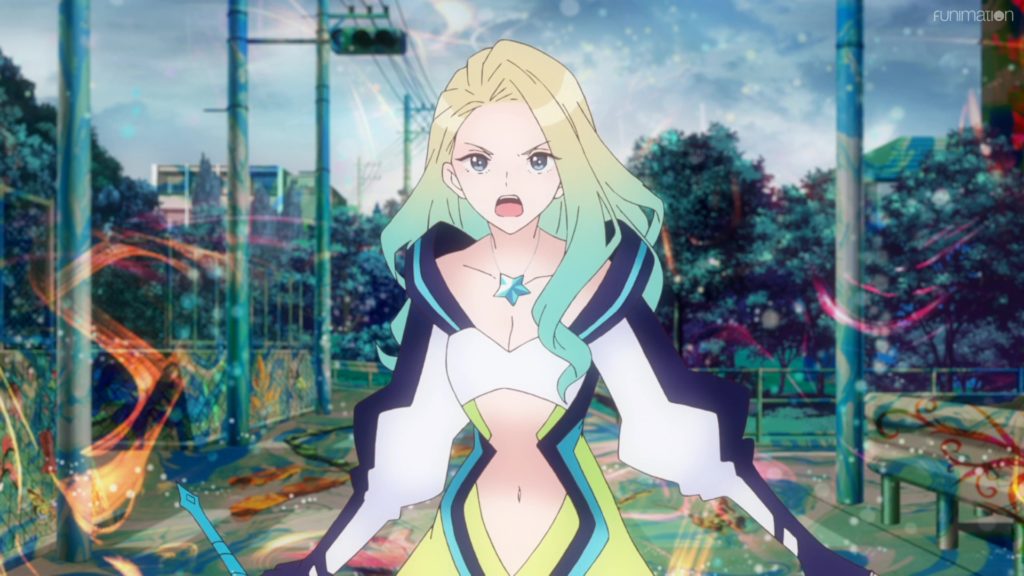
This feeling of “resonance” was one of the most important things in the original Blue Reflection game, so it’s good to see it explored in Blue Reflection Ray also. The pace of the show is picking up considerably with the third and fourth episodes, and doubtless we can look forward to many more spectacular magical girl fights in the weeks to come, if the battles for Miyako and Yuma’s hearts are anything to go by.
What are the red Reflectors really up to, though? It’s something to do with a mysterious bedridden girl that Hiori’s sister seems to be taking care of… but we’re yet to learn any real details of what that’s all about. There’s still a long way to go in Blue Reflection Ray as a whole, though — and it’s going to be an interesting journey, for sure.
You can watch Blue Reflection Ray on Funimation.
Join The Discussion
Rice Digital Discord
Rice Digital Twitter
Rice Digital Facebook
Or write us a letter for the Rice Digital Friday Letters Page by clicking here!
Disclosure: Some links in this article may be affiliate links, which means we may earn a small commission if you make a purchase after clicking on them. This is at no additional cost to you and helps support Rice Digital!
- Letter from the Editor: passing the torch - June 30, 2023
- Super Woden GP 2 is looking promising - June 30, 2023
- Inti Creates is making a 32 bit-style Love Live action platformer - June 26, 2023




